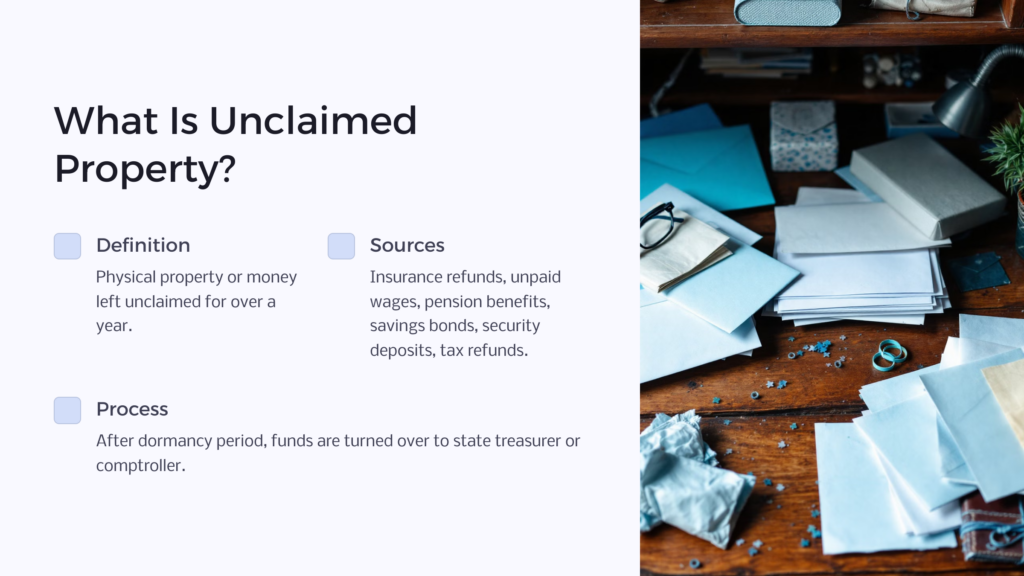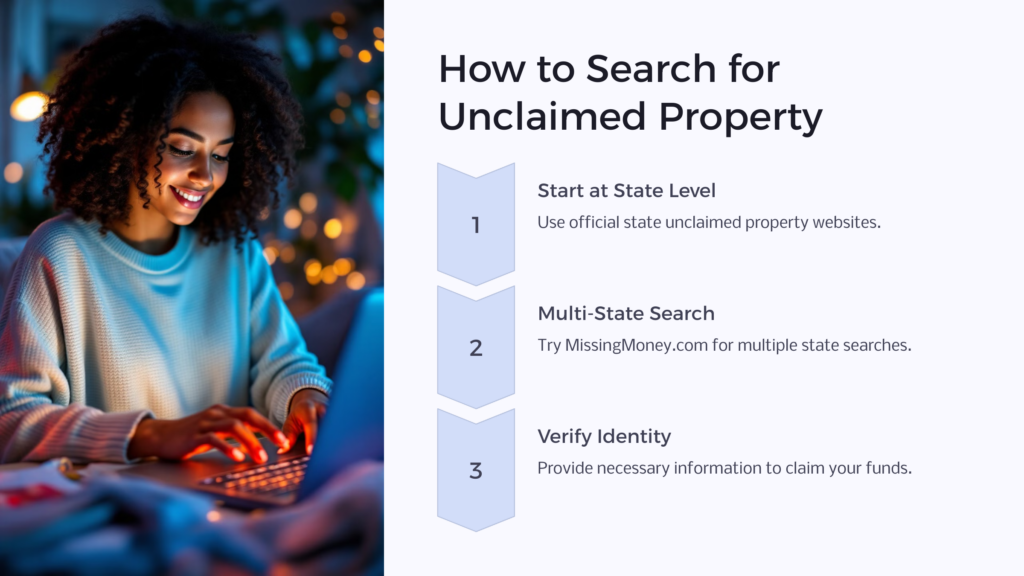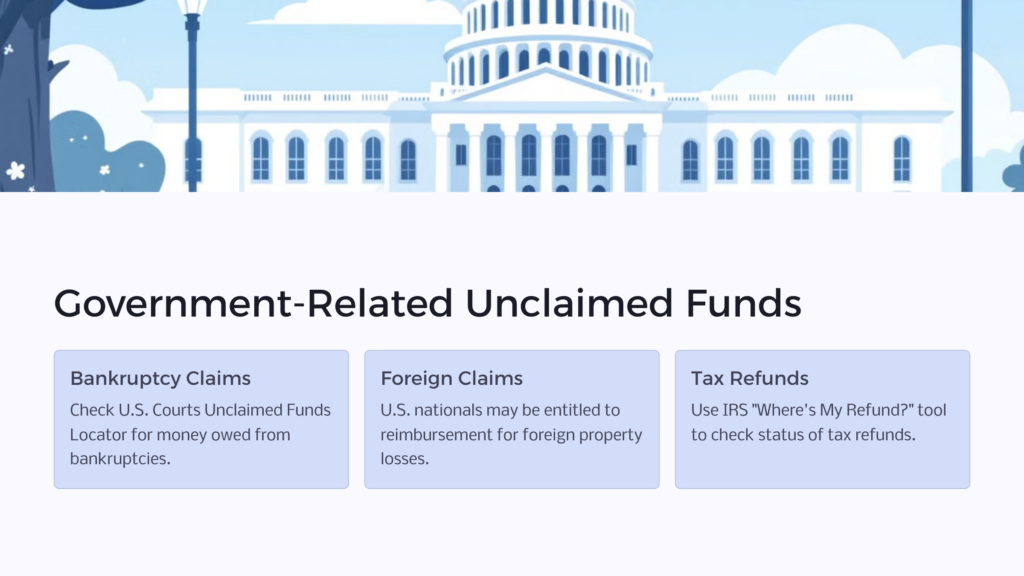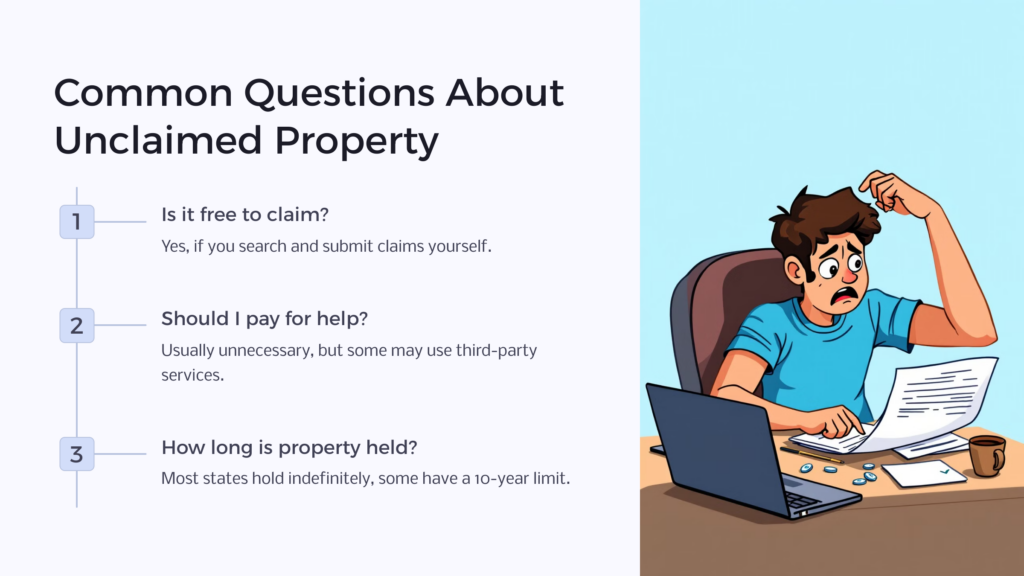There’s no such thing as free money…or is there? Unclaimed property is available to search in most states in the US for anyone who’s forgotten about previous investments. No, not just anyone can just take it, but you might be surprised with what you find!
7 Ways To Find Unclaimed Money From the Government
- Unclaimed Property By State
- Missing Money from Employers
- Unclaimed Money from Insurance Companies
- Unclaimed Money from Banks and Investments
- Unclaimed Money from Bankruptcy
- Unpaid Foreign Claims
- Unclaimed Money from Tax Refunds
Money can be left unclaimed for several reasons. Sometimes it’s a missed refund from taxes or an insurance payout. Other times, it’s dividends from long-forgotten stock or bonds, or unpaid wages from a previous employer that never made their way to the rightful owner.
Whatever the reason, this lost money is eventually transferred into accounts managed by state treasuries or the federal government and held there indefinitely—waiting for the owner to come along and stake their claim.
If you can find money with your name attached to it, it’s yours for the taking! In some cases, it could be as low as $20, but it could also be in the thousands. With over $3 billion returned to Americans every year, there’s no telling how much could be waiting for you.
What Is Unclaimed Property?

People are looking for ways to cut back on their expenses and save money. You might be looking for discounts for senior citizens, discounts for veterans, or other ways to generate income. But what if there was free money just waiting for you?
Unclaimed property can be physical property or a sum of money that has been left unclaimed by the owner for more than one year. This is called the “dormancy period” in which there’s been no contact from the owner and the funds are then legally required to be turned over to the state treasurer or state comptroller. This unclaimed property can come from sources like insurance refunds, unpaid wages, pension benefits, savings bonds, security deposits, and tax refunds among others.
If you’re curious about any unclaimed assets that may be in your name, it’s free to search and the best way to start is at the state level, and by law, each state must make this service available to all citizens. You’re under no obligation to use this service, but if you choose to, know that states cannot charge for their services and if you do find unclaimed money in your name you’ll be able to retrieve it for free. This search can also be performed for a deceased relative though you’ll likely need to provide information like bank statements that prove your right to the funds. Once your identity has been verified, the state usually issues a check for the unclaimed funds.
In some cases, a state may reach out to its residents directly about unclaimed property via a mailer, newspaper advertisement, public notice, or through outreach events. If you receive a notification about unclaimed money, ensure it’s coming from a verified government organization. When in doubt, check with your state’s treasury department.

1. Find Unclaimed Property by State
If you’re just dipping your toe in the world of unclaimed money, there are a few simple searches you can perform to see what’s out there.
State-Specific Searches
To search in your specific state, the first thing you’ll need to do is find your state’s official unclaimed property website (see the table below). For the most part, use government-sponsored sites to avoid unnecessary fees charged by third parties. At the very least, please make sure the site you’re using is credible by double-checking all links and not entering sensitive information.
Each state’s page will look a little different, but most will only require you to enter your name and will give the option to include an address to get more precise results. If you do choose to include an address, try all previous addresses your name has been associated with. Your search should then pull up a list of unclaimed property for anyone with your name (or a version of it). If you have a common name, you may have to scroll through several pages of results.
Unclaimed Property by State
The most direct way to find out if you’re the rightful owner of unclaimed money is to perform a state search. This should be done for the current state you’re living in as well as any other state you’ve lived in or done business in—even if it was years ago!
The short amount of time you’ll spend searching these databases could pay off big time. In a state like California, the average amount returned to an individual is $201.12, and in New York state it’s $704.85! In fact, each day, the state comptroller’s office in New York returns $1.5 million to claimants.
Each state has a government agency that runs its unclaimed property division. Although some websites attempt to aggregate information from multiple states, there is still no national department that has information for the whole country.
| Alabama 334-242-9614 | Kentucky 800-465-4722 | North Dakota 701-328-2800 |
| Alaska 844-252-2741 | Louisiana 888-925-4127 | Ohio 614-466-4433 |
| Arizona 602-364-0380 | Maine 207-624-7470 | Oklahoma 405-521-4273 |
| Arkansas 800-252-4648 | Maryland 410-767-1700 | Oregon 503-986-5200 |
| California 916-464-0641 | Massachusetts 617-367-0400 | Pennsylvania 800-222-2046 |
| Colorado 303-866-6070 | Michigan 517-636-5320 | Rhode Island 401-462-7676 |
| Connecticut 800-833-7318 | Minnesota 651-539-1545 | South Carolina 803-734-2101 |
| Delaware 855-505-7520 | Mississippi 601-359-3534 | South Dakota 605-773-3378 |
| District of Columbia 202-442-8181 | Missouri 573-751-0123 | Tennessee 866-370-9429 |
| Florida 850-413-5555 | Montana 406-444-6900 | Texas 800-321-2274 |
| Georgia 855-329-9863 | Nebraska 877-572-9688 | Utah 801-715-3300 |
| Hawaii 808-586-1589 | Nevada 702-486-4140 | Vermont 800-642-3191 |
| Idaho 208-332-2942 | New Hampshire 603-271-2619 | Virginia 800-468-1088 |
| Illinois 800-961-8303 | New Jersey 609-292-9200 | Washington 360-534-1502 |
| Indiana 866-462-5246 | New Mexico 505-827-0700 | West Virginia 800-642-8687 |
| Iowa 515-281-5367 | New York 800-221-9311 | Wisconsin 608-264-4594 |
| Kansas 785-296-4165 | North Carolina 866-622-2741 | Wyoming 307-777-5590 |
Multi-State Searches
It can be helpful to search multiple states at the same time if you’ve moved around a lot. While it’s relatively easy to search each state’s page one by one, a better option may be to try MissingMoney.com, which never charges a third-party fee. MissingMoney.com is a free database sponsored by NAST (National Association of State Treasurers) that includes most states. It’s ideal if you’ve lived or worked in multiple states, since it will display any results within the partnering states on the same page.
Third-Party Locators: Be On Your Guard
Some third-party organizations can help you find unclaimed property. These services will almost always charge a fee, but you don’t have to use them. These organizations, sometimes called “locators” or “finders,” are professionals at finding abandoned property and unclaimed funds. They are usually legitimate businesses licensed through the state that can help you find and claim property.
The fees are usually represented as a percentage of the total amount claimed. This will vary by state, but is typically under 10%, though most people will be able to find and claim money without the need of a locator.
If you do choose to use a locator, beware of scammers. If someone reaches out to you from a third-party locator, they are likely trying to charge a fee for their services. They may legitimately be able to help you get your money but beware of prohibitively high fees. Many states set a limit on how much locators can charge (typically 10%), but many of these predatory organizations will attempt to charge as much as 50%!
2. Missing Money from Employers
Unclaimed money could come from unpaid wages due to payroll checks never being cashed, overtime work that didn’t get included in your wages, pensions or retirement plans that were never cashed out, or a refund of overpaid benefits.
To connect former employees with missing funds, the Department of Labor (DOL) has issued new guidelines to businesses to help them be more proactive in contacting past employees. This is due to a recent finding that most businesses weren’t in compliance with the Employee Retirement Income Security Act of 1974 (ERISA), which mandates that plan fiduciaries must make every effort to locate missing plan participants.
If you feel you’re still owed money from a former employer, the first step is to search for your employer through the Wage and Hour Division (WHD) website. This resource, called Workers Owed Wages (WOW), is a free service run through the DOL that holds onto wages of former employees for up to three years.
If you are unsuccessful in locating your employer or having your earnings returned to you, you can file a complaint with the DOL for help reclaiming your benefits. To do this you’ll need to enter basic personal information about you and your employer. In some cases, you’ll also need to provide information about your past wages and how you were paid.
3. Unclaimed Money From Insurance Companies
Insurance refunds are one of the biggest sources of unclaimed money out there. This could stem from insurance that was provided through an employer, a transferred homeowner or auto policy, or a life insurance policy. However, two large sources of potential payouts that many people tend to overlook are VA Life Insurance Funds and FHA Insurance Refunds.
Veterans should look into past VA Life Insurance Funds through the VA’s database by entering their full name. This will pull up any unpaid insurance refunds from programs like United States Government Life, National Service Life Insurance, Veterans Special Life Insurance, Veterans Reopened Insurance, and Service-Disabled Life Insurance. Many times veterans will be the recipient of benefits that they didn’t even know they had. Importantly, this will not include Servicemembers’ Group Life Insurance (SGLI) or Veterans’ Group Life Insurance (VGLI) policies. If you feel you’re owed a refund for these, you’ll have to contact them directly.
Anyone with an FHA-insured mortgage (home loans backed by the Federal Housing Administration) may have an FHA Insurance Refund waiting for them to be paid by the U.S. Department of Housing and Urban Development (HUD). To perform a search for this refund you’ll need to enter your name as well as your FHA case number. You can typically find this nine-digit number on your closing documents or promissory note, but if you have trouble locating it you can either contact the FHA or the lender who originated your loan.
4. Unclaimed Money from Banks and Investments
Claiming funds from a financial institution, a trust fund, investments, stocks, or bank accounts is another common way people find missing money that’s owed to them. It’s even possible you have an uncashed check or assets tucked away in a safe deposit box that you don’t even know about!
SEC Claims Funds
If you believe you’re owed money from a past investment you made or if you have any uncashed dividends, the Securities and Exchange Commission (SEC) keeps a running list of class actions they have taken against organizations or individuals. You can search this database by the case name, or scroll through the alphabetized list.
Savings Bonds
You may have savings bonds in your name that you’re unaware of, or that have fully matured and should be claimed. These are bonds that are over 30 years old and have stopped earning interest. Many times these savings bonds are claimed on behalf of deceased relatives, and you may be the rightful heir to a sum of money without even knowing it. Go to TreasuryHunt.gov to see what’s waiting for you! You can also get help on this site to replace or reissue an existing bond that may have been lost or misplaced.
Bank Failures
The Federal Deposit Insurance Corporation (FDIC) insures deposits for most large banks, so when one of these large institutions goes under, the FDIC can make payouts to customers who would have otherwise lost their money. Search the Unclaimed Funds database to see if you’re owed any unclaimed cash.
Credit Union Failures
Like banks, credit unions are also insured, but their coverage is administered by NCUA’s (National Credit Union Administration) Asset Management and Assistance Center. Check here if you were part of a closed credit union and feel you may be owed money.
5. Unclaimed Money From Bankruptcy

When a business or individual declares bankruptcy, usually their non-essential assets are liquidated. In other cases, the business will remain operational and the profits will go towards paying off creditors. Either way, if you’re owed money from an organization’s bankruptcy declaration and haven’t received any payment, you should check the U.S. Courts Unclaimed Funds Locator.
The courts make every effort to get money to creditors, but they may have had an incorrect address for you, may have issued a check that was lost or never deposited, or you may be related to the original recipient and can fill out a claim form on their behalf. Because bankruptcy funds go through the state and federal court system, you typically won’t find these doing a standard state search.
6. Unpaid Foreign Claims
In rare cases, a U.S. national may be entitled to reimbursement from the Department of the Treasury through the Foreign Claims Settlement Commission (FCSC) if they experienced a loss of property or assets while in a foreign country. These would cover losses like damage to person or property due to military actions, or if a foreign government has taken control of your personal property (known as nationalization).
A claimant seeking a foreign claim would first have to contact the FCSC to file a report. If approved, it would then be paid by the Department of the Treasury.
7. Unclaimed Money from Tax Refunds
Tax refunds are another huge source of unclaimed money. Today, many people get their tax refunds via direct deposit. But if you are still receiving paper checks and haven’t updated your physical address with the IRS, it’s possible your refund was sent to the wrong residence.
The IRS runs a website specifically for people who have not received their refund check for any reason: Where’s My Refund? To check the status of your refund, provide documentation proving your identity (including your social security number or Individual Taxpayer Identification Number (ITIN)), your filing status, and the exact refund amount (down to the penny).
Many people may also have questions regarding COVID-19 stimulus checks that were sent out when the CARES Act passed in March of 2020. Most Americans received their checks in the mail or by direct deposit, but if your address wasn’t updated, or if you didn’t file your taxes in 2018 or 2019, it’s possible you didn’t receive your payment.
Typically, those who did not receive their stimulus checks should claim that amount on their next tax returns via the Recovery Rebate Credit. If you’ve missed any of the stimulus payments, you can check the status through the IRS’s website at Get My Payment. This site also has more specific information on what to do if you’re unsure if you qualified for payments in the first place.
If you’re due a tax refund but haven’t filed a tax return, you may want to reconsider. You can still file a return even if you earned less than the filing requirement, and it may be worth the effort to receive a past refund, your stimulus payment, or an EITC (Earned Income Tax Credit). If you are missing your state refund check, you’ll need to contact your state revenue department.
Common Questions About Unclaimed Property

Will it Cost Me Anything to Claim Money?
Not if you search and submit claims by yourself. You may, however, choose to work with a third-party organization to help you locate funds. If you do, try to find a business that charges no more than 10%.
Should I Ever Pay Someone to Help Me Find Money?
Possibly. These third-party companies are not necessary for the majority of people, but if you are having trouble locating funds or if you know you have a large amount of money waiting for you that’s proving difficult to get to, you may want to reach out to one of these locators.
Most unclaimed money doesn’t move under the jurisdiction of the state treasury until at least a year has passed with it remaining unclaimed. If you know you have money waiting for you but it hasn’t been a year, these services may be able to help you locate and receive the money faster.
Why Didn’t I Know About This?
Great question! Because it’s managed by federal and state agencies, there’s not a lot of publicity around it. Most people read about unclaimed money and assume it’s a scam because it sounds too good to be true. However, it is very real, and regular people are finding money every day.
How Long Will States Hold Onto Unclaimed Property?
This varies by state, but in general, states will hold onto unclaimed property indefinitely after the initial year dormancy period has been reached. Some states have a 10-year limit on how long they’ll hold money.
Does Your State Owe You Money?
For comprehensive information about unclaimed property, look into the National Association of Unclaimed Property Administrators (NAUPA). NAUPA is a national organization that works with treasurers from each of the 50 states, the District of Columbia, Puerto Rico, Kenya, as well as several Canadian provinces. NAUPA helps to provide basic information about the process for finding money and how to go about claiming it.
Even if you don’t think any money is owed to you, you should still take a few minutes to check your state’s unclaimed money site. This doesn’t mean everyone will get money, but on average, about 10% of Americans have some amount of cash waiting for them.
You can also share this information with friends or relatives, or even perform the search for them, and pass along the results to them. After all, who doesn’t love free money?
 Benefits.com Advisors
Benefits.com Advisors
With expertise spanning local, state, and federal benefit programs, our team is dedicated to guiding individuals towards the perfect program tailored to their unique circumstances.
Rise to the top with Peak Benefits!
Join our Peak Benefits Newsletter for the latest news, resources, and offers on all things government benefits.



















